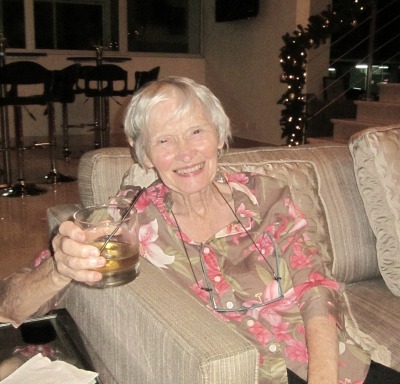
He left Puerto Armuelles to spend what he thinks are his final years living with a close friend in Costa Rica. This woman is half his age, very kind, and she has the resources to provide for all of his needs.
This situation, and the fact that Betsy and I have 2 elderly parents currently in assisted living in the U.S., has prompted me to do a bit of thinking and researching on the subject of aging.
This article is aimed at readers who are thinking about retiring in Panama.
I hope you find it useful. Please send in comments, since we hope to continue writing about this very important topic.
On those very rare times when Betsy and I actually talk about "when we get truly old" or aging (other than to complain about aching shoulders, hips, fingers, you name it), it seems that Betsy is inclined to want to be in Seattle, or living with or near one of our daughters, wherever that may be, when she gets to be truly old.
I, on the other hand, though I will miss my friends and family from the north, imagine that a life in a warmer climate, would be optimal, at least most of the year. Fortunately, in our case, I am probably willing to acquiesce to Betsy’s preferences. Her wisdom in such matters is generally correct. Our family always benefits when we follow Betsy’s intuitions. (Of course, she could also change her mind.)
Having admitted all this, I still think that there is a good place in our retirement plans for Panama, particularly in our early retirement.
But why would a person choose to arrive at his/her final years, and final days in a foreign country, far from family? What are the potential advantages/disadvantages? Is this a valid option for retirees to consider?
There is lots of hype on the internet about the advantages of retiring overseas, in the tropics, even in Panama itself. But what would it be like for you? (What would it be like for me? I’m 56. Betsy is 54.)
Warmer
First of all, we both agree that we feel younger in the warmth of Panama than we do in the cold and damp of Seattle (That is, except during the peak of the dry season in Panama, which is too hot for us. And during summer in Seattle, which is the most ideal weather on Earth, we think.)
Affordable Home Health Aides
If it were merely about the money, then yes, Panama is much cheaper than the U.S. (I do not know enough to make a verdict about Canada).
I just wrote another article about healthcare in Panama. In it, I mentioned that one of the biggest differences in the cost for healthcare in the U.S. vs. Panama is the vast difference in labor costs for basic, unskilled, or semi-skilled nursing care.
A large factor in health care costs for the elderly is the need for more and more hours of home health care and nursing care. The elderly expat living in Panama will have huge saving potential on such aid,
In Puerto Armuelles, it is possible to find a live-in domestic helper for as little as $400/month. In David, this cost would be somewhat higher. In Panama City, you might pay as much as $2000/month for a fully licensed professional nurse through an agency.
With careful research, checking references, you can find an excellent helper. Some expats have reported that their own domestic aid has become more like a part of their family than a hired helper. Some expats even include this person in their will as a beneficiary.
Conversely, with poor planning, or just bad luck, you might end up hiring someone who is a terrible worker, or even steals from you. (Unfortunately, this last detail can occur anywhere. I remember my well-to-do grandmother, who was blind and lived to be 97, was routinely robbed at her expensive retirement home in Washington D.C. So, you can have a bad experience of this sort anywhere).
Betsy’s mom is in a great retirement home in Seattle, about 2 miles from our Seattle home. My father is in a retirement home in Washington D.C., close to my sister’s home. Both of our parents rely upon and cherish visits from their adult children and their grandchildren.
Panama not good choice for Betsy's Mom
In the case of Betsy’s mom, she would not fare well in Panama. She has a lot of trouble “focusing” and, though she is a wonderful woman, she has trouble making real friends, because she has trouble following conversations with other adults. It is only with loving one-on-one chats with her children (including me) that she feels that emotional bond that she so craves.
Panama would have been a good choice for My Dad
In the case of my father, he has spent much of his adult life living abroad. And much of that time in the tropics (my sisters were born in Cuba). He would be very comfortable with the idea of retirement in Panama. He even speaks pretty good Spanish.
Other than my older sister, he does not see many family members on a regular basis. However, he is quite content to go to the dining hall or social hall, and strike up a conversation with just about anyone.
In truth, he says that he would have loved to retire in the tropics. In his wistful moments, he sometimes asks himself why he didn’t stay in the tropics to retire. However, at 90 years of age, it seems too late for him to make the move down to Panama. He is in a safe, happy environment and most days he seems to do pretty well. It is only on his bad days that he wishes he were somewhere else --- A lot like everyone.
Since I am now “pushing” 60 myself, I think I can relate with many of the expats who are considering a move down to Panama for their retirement.
Retirement Business
A lot of the folks who are closer to my age, on the younger side of retirement, would like to semi-retire early, and continue to do some sort of work in Panama.
That is what we have done, by investing and land developing in Puerto Armuelles. We effectively bought a small retirement business. This works well for both of us, since we have never viewed retirement as those years after 65 when one has earned the right to do absolutely nothing. We plan to stay active always, or at least as long as we possibly can.
Is Your Plan To "Go Back Home"?
Some retirees who choose to move to Panama at 55, 60, 65, or 70 may have in mind to return "back home" to be close to family and loved ones, when they finally arrive at their advanced old age. This desire is quite common. There seems to be something in each one of us that longs for the familiar, as our world grows smaller and smaller, and we prepare for our own death.
Plan Ahead to Age in Panama
There is a growing number of single retirees in the U.S., who either never married, or are divorced, or whose spouse has died. Some of these retirees may not have anyone in the U.S. to return to in their last years.
For such folks, it is probably advisable to come to Panama early enough in their retirement, so that they can become familiar with their new home, make friends, and prepare a late retirement environment that suits them. They will probably want to have a close friend or family member, at the very least, to supervise their caregivers and pay their bills, when they are no longer able to so. Even in the States, an elderly person needs someone to be their advocate, to make sure that they are well cared for, and listened to (this is a big one).
Letting Go
No matter what form your late old age takes, or where that event takes place, there is a tremendous amount of “letting go” that one must do in order to make the transition from healthy retirement, to a state of being very old, chronically weak, or sick, and eventually dying.
I know that my own father is still resentful that the keys to his car were finally taken away a couple of years ago. Betsy’s mom has had similar problems letting go of her independence, especially letting go of her car.
There are those who think that having the North American elderly loose on the roadways of Panama would not hurt the general quality of driving here in Panama…that is a subjective opinion.
I am not trying to come to any conclusions here. The idea is to inspire thinking and a dialogue about what each of us envisions as our own best scenario for our final years.
Clearly, one can live more comfortably in Panama, on less money. This, in itself, might be the answer, if you are not able to afford to retire, or be old or sick, in the U.S. (or wherever your "home" is.) However, for those who have options, the conclusion might be different.
Maybe Panama is the right choice for one’s early retirement years, as a new adventure, or chapter of your life. Maybe Panama allows you to enjoy your retirement, as well as allow you to bank all the saving that Panama offers. Because when, and if, you move back to the U.S. (or other place) to be closer to family, your living and health costs will be much high.
[leadplayer_vid id="5748DEB117A7C"]
Betsy of Living In Panama (off camera) asked:
Veronica, why did you decide to move to Panama and why Puerto Armuelles?
Veronica Answers Below
Well, I had a farm in Costa Rica for many, many, many years and I really liked Costa Rica, but
things changed.
And I started looking around.
So for 4 or 5 years I looked.
I came to Panama, in the beginning, to go to Boquete to a school, a language school there, Habla Ya, to make my Spanish much better.
So what we did was: 1st we made a list.
What things are important to us.
So we made our list.
Drew a couple of circles on maps.
I had been to Boquete for a few months. I stayed there while I went to school.
I like Boquete. However, for me it's too cold and I don't like the raininess.
To me that's .. And it wasn't near enough to the ocean.
And we started looking around for another place.
And I happened to see Puerto Armuelles on the map.
People didn't have a lot of things to say about it, buy you never know until you
go look. So we drove down.
One trip we came down here we were going to spend 3 months driving around, getting to
see all the places up close and personal. We liked some other areas as well.
We got as far as Puerto Armuelles and stayed at the Tsunami Inn.
And we stayed and we stayed and we stayed.
We met nice people, looked at land and it fit all the criteria.
So this is home.
Now we have a farm, Finca Bella Vista, in the hills just above Puerto Armuelles.
2 kilometers out, I think, totally.
We just love it.
We are building a house and a barn, a stable. I do dressage, it's dancing with your horse, so to speak. And I also am a wildlife rehaber. I specialize in birds and small mammals.
And Puerto is nice. It really is very peaceful.
We decided to retire here and this is our home now.
I love it.
There's a lot to do. I ride the horses on the beach. There's all kinds of sports. We are heavily involved in calf roping.
It's fun. I love it here.
I absolutely love it.
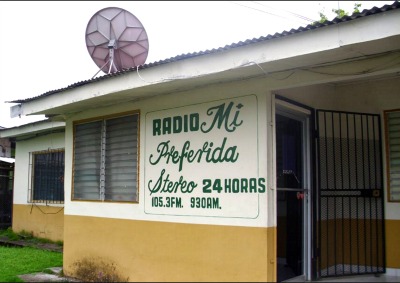
UPDATE - The radio show is currently paused (June 2016)
Recent transplants to Puerto Armuelles, Michael Butler and Beverley McAleese, have undertaken a new adventure. They will be hosting a weekly program at our local radio station “Radio Mi Preferida” (located behind Romero’s).
It is fun that our town is small enough, and simple enough, that you can still make a proposal for a radio program, do the necessary research for the show, find a way to cover costs (I am sure contributions will be welcome. Betsy and I have already pledged to contribute), and get the program on the air.
What is amazing is that in our little town of Puerto Armuelles, one of the co-anchors of the new radio show, Michael Butler, has 45 years of broadcast journalism experience in the private sector and with the CBC in Toronto, Ontario.
Michael’s roles in radio have included research, writing, and reading the news live on the air nightly. He has also produced newscasts for television that have aired nationally in Canada. He has interviewed presidents and prime ministers, beauty pageant winners and punk rockers. He even covered the 1976 Montreal Winter Olympics.
Michael’s wife and co-anchor of the new show, Beverley McAleese has a diverse background indeed. However, professional social work, and being of service to others, are a thread that runs throughout her career. Among Beverley’s social service projects have been working with battered women and women and their infants recovering from addictions, and creating a program for prostituted and trafficked women. Beverley received a Toronto YWCA Woman of Distinction Award in recognition of her career of service to the public.
While we are not familiar with the details of the upcoming radio show, Michael and Beverley have indicated that their half hour show, which airs each Wednesday at 4:30 PM, will touch on matters of spiritual significance, but without being Christian-focused, or reflecting the views of any particular belief structure or organization.
The topic of our spirituality, while living in an apparently carefree place like Puerto Armuelles, Panama is, no doubt, of significance to all of the expats here. Some of us have gotten together to discuss, or at least we are highly aware of, the challenges that arise when one makes the big decision to pick up stakes and move to Panama, only to discover that, just because we live in “paradise”, doesn’t mean that our lives are paradisical.
Ultimately, we all have to confront the same basic challenges that we faced before, in our “old lives” wherever it was that we were living. In fact, a number of Puerto Armuelles ex-pat residents have lived in a tropical paradise before, in Costa Rica, or elsewhere in the tropics. What on earth could cause one to leave paradise and move to another paradise ?(other than taking a bite of that forbidden apple, or mango)? My guess is that if the first paradise didn’t solve the problem, then the second (or third, or fourth) paradise is not going to do it either.
If none of this applies to you, congratulations, (I would like to read your book). However, if you are like most of us, then you are a “work in progress”, and you can probably learn something useful from Michael’s and Beverley’s program. Or call in, or email in something useful to add to the conversation.
I wrote abit about spiritual life in Panama in this post.
You can listen online or on an old school radio.
The radio station is Radio Mi Preferida Estero at 105.3 FM or 930 AM
Visit the radio station's website to listen online.
It's a weekly show on Wednesdays from 4:30 to 5pm.
Their first show is this coming Wednesday, May 4, 2016
I am sure they would appreciate you listening.
I don't know if you can contact them during the show, but if you can, the radio booth phone number is 770-7408.
Break a leg Beverley and Michael!
And thanks for taking on this new adventure.
[leadplayer_vid id="57261D0B32748"]
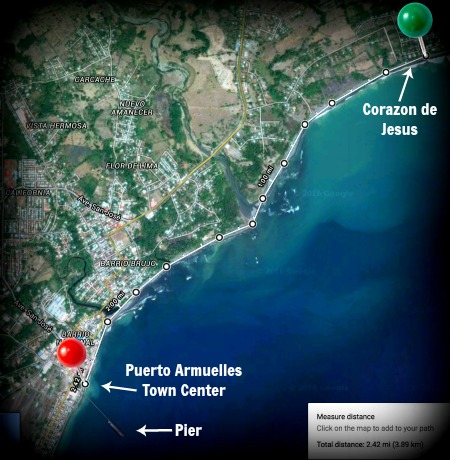
I had been thinking of doing it for awhile, but I finally shook off my laziness and did it. And I took my daughter along for the ride.
We are both happy we did it.
According to Google, it is 2.42 miles from the Corazon de Jesus neighborhood to downtown Puerto Armuelles.
I cannot tell you how long it took since we stopped so very often, but I'm thinking if you were a little more focused on your destination you could do it in about 40 minutes.
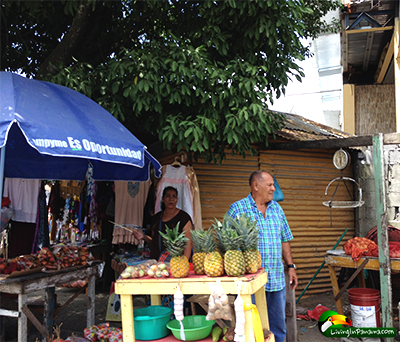
I am writing this in late March, the peak of the dry season, and the temperature can get pretty hot in these months (today there is a wonderful breeze blowing off the ocean, so it is not too hot). Since our house is not air conditioned, I sometimes find myself driving my wife’s air conditioned car to Romero’s supermarket (also air conditioned), possibly buying a local paper, and reading it at a leisurely pace, while I sip a Cappuccino (50 cents) in air conditioned bliss. When I am finished reading and sipping, I slowly wander through the aisles to choose my groceries in this comfortable, modern supermarket, before heading home to the family.
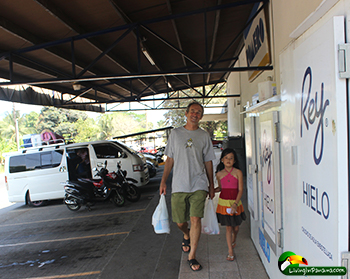
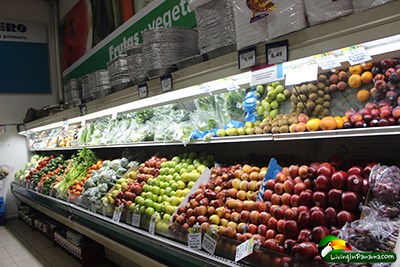
I know that I am paying more for groceries, particularly fresh produce at Romero’s than I would from one of the street vendors. Plus, the quality is not as good as it would be from the small street stalls, or pickup truck vendors who buy their produce directly from the farmers. They don’t take the produce to a central distribution center, as Romero’s does, before bringing it to Puerto Armuelles.
I have come to realize that, during the cooler, “rainy season” I go to Romero’s far less frequently. (FYI the rainy season is from mid-April to mid-December.) Most days in the rainy season, I ride my bike to run errands around town. Then, I avoid the modern supermarket. My family tends to eat more healthfully, and our grocery bills are much lower.
But this article is not about our Rainy Season-Dry Season climate here in Panama. It is about how you can save about 50% on your grocery bill, as well as eating a much healthier diet, if you buy your produce from the street vendor rather than going to Romeros or another
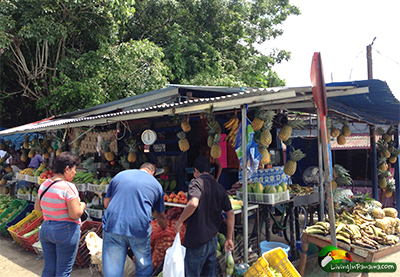
Supermaercado.
(If you do want to know about the weather in Panama, Betsy wrote about it here.)
The best days to shop are on dias los jubilados, which is when retired folks all over Panama line up to receive their semi-monthly social security check. On those days the number of vendors and the variety of items for sale skyrocket.
Find out about Chiriqui's Organic Farm, Finca Santa Marta. They deliver organic produce to you here in Puerto Armuelles and throughout Panama. The info is under Tip #2, Eat Healthfully & Locally.
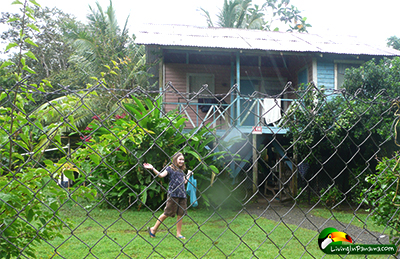
In addition to great value on super fresh produce, you can also save a bundle by purchasing fresh-caught fish from local fish buyers in Puerto.
There are several neighborhoods where a local wholesale fish buyer buys from the fishermen and will sell to you at very reasonable prices.
For example, you can always find fresh:
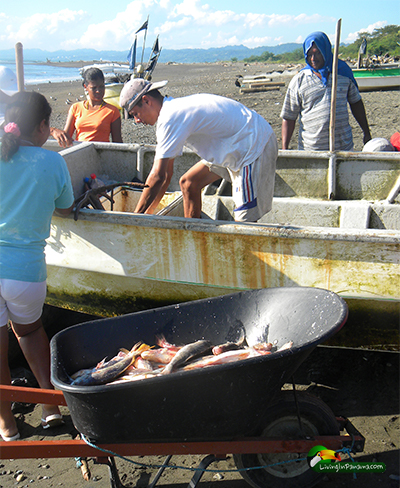
I suppose that you could try to buy directly from the fishing boat, but I have a feeling that this would not go over well with the fish buyer. Generally, all fish in the neighborhood fishing fleet are sold to one or two buyers. They get a consistent product, and they provide a consistent market for the fishermen.
Of course you also run into people trying to sell you seafood out of a bag - with no ice - I always say no to that.
Watch a video of buying fish fresh off the boat in Puerto Armuelles.
You can also buy both beef and pork from local ranchers, and save a bundle. You might have to buy an entire side, or quarter of a steer, or pig, but if you ask around, you can usually find some one to go in on the purchase. But to do that successfully, you will need to purchase a dedicated freezer to store your meat.
One neighbor of ours frequently raises a pig for his family’s own personal use. He has also built a smoker, so that he can custom smoke his own bacon, and he stuffs his own, custom smoked and seasoned pork sausage. Neighbors and friends who get on his “list” early can enjoy the same great quality pork products.
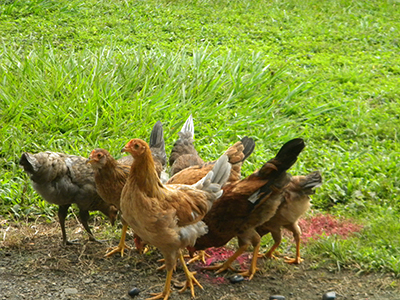
I was surprised to find that free range chickens (gallina de patio) tend to cost much more than commercially raised chickens. While a whole chicken at Romero’s, if you can find one, might cost $6 or $7, a family raised, free range bird might run as much as $13, o$14. Once I discovered just what effort it takes to raise a chicken, successfully, to adulthood, in and around one’s own yard, I understood.
As a side note, this short video below shows the challenges we had raising gallinas de patio. Of course, our daughter would never even think of us eating her chicken friends.
[leadplayer_vid id="5724C858929BD"]
The free range birds, are truly free range, and these will be the same birds that you have seen running around near the street (or in the street--- so drive carefully; “You killed it, you bought it”, as the saying goes.) When people have gallina de Patio to sell they will sometime announce that fact by posting a sign saying simply, Gallina de Patio. Ask around and you can find out who usually sells them.
Important Cooking Tip For Gallina de Patio
If you decide to buy one, you cannot cook it like you would a "regular"chicken. These birds are tough. Gallinas de Patio eats mostly bugs, and table scraps, and do not usually eat any commercial (read, hormone-fortified) feed. Thus they eat a lot more protein, very little grain, and no chemicals. They grow more slowly and get a lot more exercise than their caged counterparts. In short, these birds live a life that is a lot closer to that which a wild fowl might live. As a result, these chickens are leaner (stringier and tougher) and have a stronger, “gamier” flavor.
The first time our family tried one of these birds, we put it on the grill and basted it in barbeque sauce. We just assumed that a really “special” chicken should be cooked on the grill and enjoyed all by itself, so that the flavor could be experienced.
We were wrong.
It was like chewing on a moccasin. The free range gallina de patio is better slow cooked, in a stew pot, so that the meat has time to become tender, and so that all the rich flavor of the meat can infuse the entire stew. If you try this, you will quickly discover the superior flavor of the gallina de patio. It is a delicacy. This is what chicken used to taste like, before all the gallinas de patio were rounded up and packed 7 per cage in the mega “chicken farm”.
How to cook a Gallinas de Patio - for Sancocho, of course.
When you move to Panama, you find that you have a lot more free time on your hands. One satisfying way to spend part of your day is to shop for, and prepare the best quality food available. You will find that you can lose weight, improve your overall health, and save a bundle on your grocery bill at the same time by taking advantage of buying directly from small local producers and vendors.
Learn 4 essential tips for healthy living in Panama.
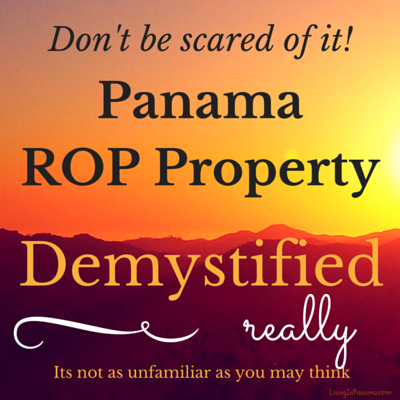
A little history may help.
In the beginning, land in Panama did not belong to anyone. The indigenous people used it collaboratively.
Then the Spanish came.
They declared all land in Panama belonged to the Spanish Crown. However, the Crown only cared about the land from Colon to Panama City - for the same reason it is valuable now, as a port for global trade.
In the interior, the Crown continued the communal tradition of Panama's indigenous people by selling some land to villages to be owned collectively. Some large tracts of land were also granted to favored subjects. On the rest, the Crown recognized the right of small farmers to use, but not own, as much land as they needed.
At that point it was a bit like feudal England. The Crown was fine with you using its land as long as you played nice and obeyed the King or Queen. And even after its grants and sales, almost all of the land in Panama remained untitled and in the Crown's domain.
Then, 300 years later, Spain left. All of that land now belonged to the new government.
Not Much Titling Going On
The new Panama government asked its citizens to title any land they were using by showing proof of their land claim. But very few bothered to do that.
Getting title was an expensive and long process. Even many of the wealthy folks didn't do it. That's because once you title, you must start paying property and capital gains taxes.
Titling today is much cheaper and somewhat faster. However, most land in Panama continues to be ROP with the government holding the title. So in many ways it continues today the way it did when Panama was a colony of Spain.
Of course, as we all know, even in North America with its almost 100% titled property, government can step in. Have you heard of Eminent Domain? Trump and Cruz were arguing about it in a debate a few months ago. That is, if the state needs your property they can come in and take it, with a "fair market" compensation, of course. Trump and Cruz were arguing whether it was okay for the government to take land to build a parking lot.
It means you can use the property any way you want, just as if you held title to the land. It means you own the right to use the land, just as if you had the title.
Except, because you don’t own the title, you don’t have to pay taxes.
Required Research
Since ROP properties are not registered with the State, you need to make sure that the person selling you the property really owns it. See this post on how to buy ROP property safely for more on how to do that.
To avoid doing that work, you can buy ROP land from someone like us who has done all that work for you. We go through an extensive investigative process to ensure that there is a clear ownership trial and collaborative documentation for all our ROP properties.
Required Maintenance
In addition to research, you have to go out and physically claim your property in a noticeable way. Something that says there are new owners of this property. We always recommend that you immediately put up a fence. If a fence is already there, paint the fence. At a minimum, have someone go out on a somewhat regular basis and keep the grass cut. Just something so everyone knows that the property is owned and cared for by you. You don't have to be there yourself, the fact that you are hiring someone to cut the grass is enough. Or you could build a rancho or some sort of structure.
You are establishing that you are the new owner, the person that holds the right to use the property. If there is ever a legal challenge, the court will ask for your proofs of ownership. That is when you pull out your evidence of activity.
We have been establishing ownership of our ROP property for years. We put up fences on all our properties and maintain them. We also get to know our neighbors. That isn't necessary, but it is a good idea for many reasons. My husband especially loves to chat with all the neighbors. He even knows the names of all their dogs. Because of this there is no doubt in anyone's mind about who owns those properties - we do. And that certainty of ownership is entirely passed on to you, when you buy our property.
Maintenance & Titled Property Keep in mind, you need to keep your eye on titled property too. If someone is using your land for 10 years in good faith (that is, they didn't know you owned it), they can get title. Or in 15 to 20 years if they are using it in bad faith (that is they know you own it, but decide to ignore that fact.)
Of course, that can happen in the States too.
My sister-in-law lost part of her land because for years she allowed a neighbor to garden a section of it. When she went to sell it, she faced a legal battle to keep that "garden" as part of her land. She lost. Her neighbor is still gardening that strip. My sister-in-law sold her property minus that section. She never got reimbursed for the loss.
You can avoid my sister-in-law's loss in both Panama and the US by simply having the people using your land sign a document. A document that states they are using the land on a temporary basis, or even better yet make it a rental agreement, even if only for a nominal fee. That precaution works for both ROP and titled land.
Pay No Taxes
ROP property is excluded from property taxes and all land transaction taxes (i.e., capital gains, transfer fee).
Learn more about Panama property taxes & exemptions here.
There is a big market for ROP property. It is routinely bought, sold, and traded - just like titled property.
You can just as easily earn a profit reselling ROP land as titled land.
In fact, some people prefer ROP to titled property. This is because, as I've mentioned, you don't have to pay property or capital gains tax with ROP property. In addition, ROP land tends to be cheaper than titled land.
As I alluded to in this post, some of the same kind of land issues with ROP (and titled) property in Panama occur in North America as well (think of my sister-in-law's property loss and eminent domain).
Now that you have a clearer understanding of what ROP means, you can decide if the benefits of ROP land outweighs the costs.
Which type of property are you looking to buy? Please share in comments below.
Check out these links to get our guide to titling Panama property . You can also read about 3 things you must do when you buy ROP property.
If you have questions, please feel free to call us or leave a comment below.
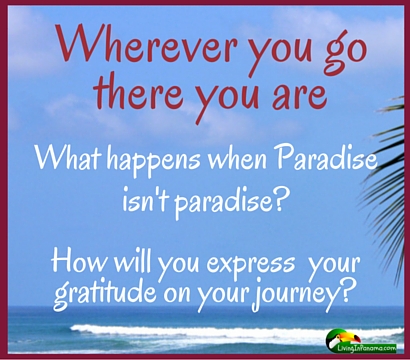
I hope that we have been clear, and honest with our readership in saying that the old saying, “wherever you go, there you are”, applies here too.
Puerto Armuelles, Panama is no different from anywhere else on the planet. What you bring to each day, is what you can expect to receive from each day.
One thing I am happy to notice in some of our recent arrivals to town is a serious, disciplined approach to their spiritual life. I do not refer to those who believe that the world is going to Hell, and that they need to find a place to hide out, and hoard scarce resources, so that they don’t have to share any.
I have spoken to a number of folks lately who talk about getting together for meditation practice, yoga, and non-denominational spiritual talks. There is even more talk about “giving back” or “paying it forward”, in the sense of a grateful recognition of all the gifts that we are being given each day, and a sincere desire to want to share our good fortune with others. I'm not saying that the old-time Puerto expat don't have those same goals, just that I am encountering a greater number of new people who are actively expressing those goals.
I think that living in another culture, as our family has in Panama for almost ten years, causes one to appreciate our good fortune to be able to experience this very simple lifestyle, and a low stress pace of life, which has allowed us to live several years within each calendar year. Time still passes for us. But, it doesn’t feel as if we are running frantically just to keep pace with our society. It is much, much slower here.
However, if you pay attention to poltics here it can be demoralizing. For instance, from reading the papers and speaking to locals, one realizes that the arrival of the Del Monte fruit company to take over banana production for our region may not take place all because of political influences that have nothing to do with the production of bananas, nor with the employment of hundreds, or thousands, of workers. The apparent reason for the possible non-signing of the contract with Del Monte, according to local experts, is that the favors being offered by Del Monte to the signatories here in Panama are not sufficient. (Although, now we hear it may actually get signed and approved. We will know when we learn that Del Monte is actually hiring people to work the banana plantations.)
I will say no more about the Del Monte negotiations. But the situation reminds me that I am very fortunate that my own livelihood is not dependent upon the good will of Panamanian politicians.
As an expat, whether you consider yourself wealthy or poor, you are automatically perceived by the vast majority of locals locals as visiting “rich and powerful elites”. It can be a bit unsettling when you realize this. But in reality even if we consider ourselves barely making it, we are most likely much better off that a big segment of the local population. So at least comparatively, you are well-off financially.
My questions today, of myself, and of all of us, are these:
What do we intend to do with all of our good fortune, or resources, our talents, and our connections? With all this time at our disposal in Panama, do we have a personal plan of action that includes working on the spiritual side of ourselves, and not just on the material? Do we have a plan of action that includes concrete steps to make life better for others less fortunate than ourselves? Or are we content to just make sure that we ourselves are safe and comfortable? I know it is a struggle to turn our focus away from ourselves and our family, but is it a valuable goal?
What are your thoughts?
March 26, 2016 by Skylar Vayda and Betsy Czark
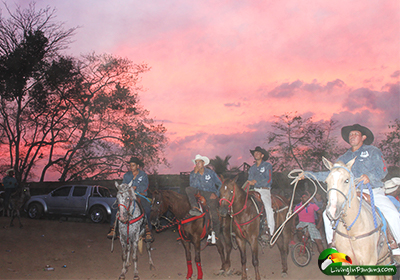
The Rodeo, or Pista de Lasso (as it is called in Panama) consists of lasso teams competing to lasso a calf in the shortest time possible. And definitely under 20 seconds, which is the maximum amount of time a cowboy has to lasso a calf within an 80 meter long space.
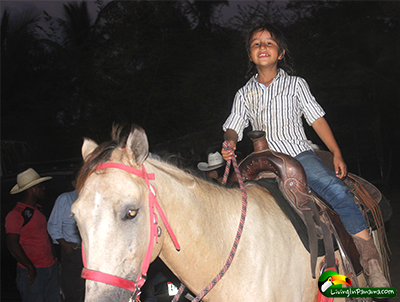
The rodeo begins at 11 am and goes into the evening. Because of this time frame, as the day progresses, some teams perform more poorly than others because one or more of their riders is drunk.
The rodeo's atmosphere is lively and at time intense, as the supporters of each team shout their encouragements. There is also a fair amount of unofficial bets being placed, so that may be something to look out for.
My (Skylar's) past experiences at the rodeo have been wonderful. I loved horses when I was younger. Because of that I especially enjoyed seeing the pure breed horses outfitted in their colorful harnesses. I went often when I was younger. I even owned my own lasso so I could practice. But I watched much more lassoing than I practiced.
The rodeo season is a large part of the culture in Panama. While in Panama you should definitely experience it at least once.
Puerto's Rodeo Schedule
Rodeos occur on 8 consecutive Sundays. The first rodeo was on March 6th.
The Pista de Lasso technically start at 10am, but usually don't get going until 11ish. Food and drinks are sold at the events.
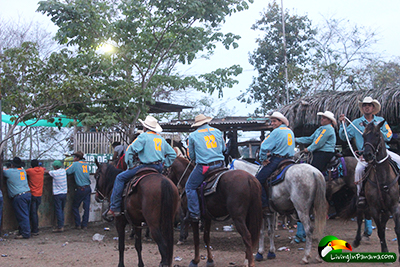
5 Remaining Competitions
March 27 - Location outside of Puerto Armuelles
April 3rd - Casa de Puma - located about 3 miles from downtown Puerto
April 10th - Location outside of Puerto Armuelles
April 17th - Romero Arena in Altos San Vicente neighborhood
April 24 - Location outside of Puerto Armuelles
There are a total of 10 teams competing in these rodeos. Four are from Puerto Armuelles. One of those teams is sponsored by 2 Puerto Armuelles expats & horse lovers: Veronica and Tony.
Do you want to be part of a team? You cannot just join, you must be invited. The teams are really clubs. To show your interest and prowess, you must go to the practice roping events that are held from November - February.
I will be updating this post soon. I want to impart the wealth of information about these events from Veronica and Tony.
I simply don’t have time to write it up now. But I wanted to get the rodeo schedule to folks in case they want to attend. Last Sunday, Skylar and I enjoyed ourselves at the rodeo in Altos San Vicente. The photos on this page are from that day.
March 26, 2016
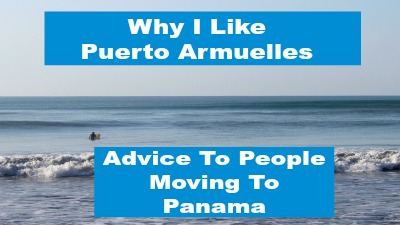
Originally, Victor said all of this in a video. However, Victor does not like the fame the video has given him, especially people recognizing him. He asked me to take the video down. I kept the interview transcription below.
It's peaceful. It is like Hawaii 40 - 50 years ago and I needed that kind of life. I drove down here, me and my dog and a few things and I've been here 2 and a half years now.
It is a great place. Puerto Armuelles is, like I said, like Hawaii 40-50 years ago. And that is what I wanted to find.
Some people like outside of Panama City, which is more like resorts and condos. If I wanted that, I might have well moved to Hawaii or California.
If you want to live with more local Panamanians and the culture and all that, I recommend Puerto Armuelles."
Victor
"I call it, you gotta create your own life. If you want to go to Starbucks or Macys or something- there is none of that here.
Life is simple."
Victor
"I wake up. Walk to the beach with my dog. Check if there are any waves or not.
If there are waves I go surfing.
If not, I come back home and do whatever. Make my hot chocolate, projects"...
Victor
"Learn some Spanish. I'm still really bad.
It's their country so respect their customs. Take it as an adventure."
Betsy - "Thanks Victor."
Victor
"Your welcome. De nada."